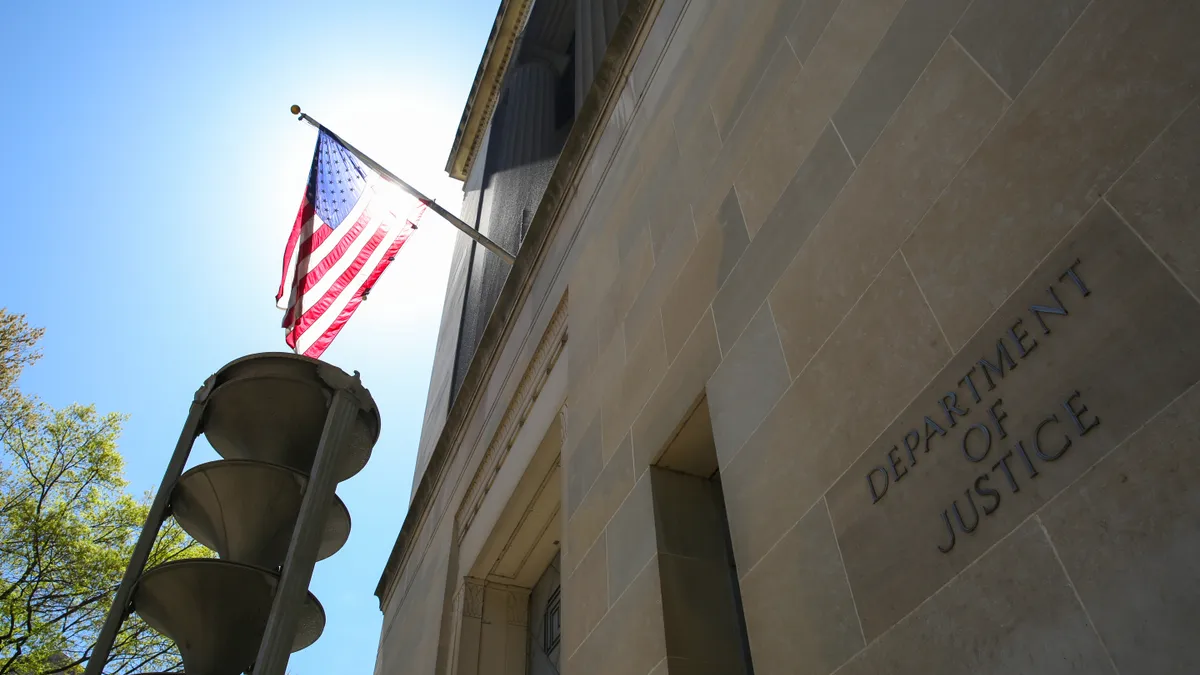The Department of Justice has filed almost half a dozen statements of interest in private antitrust cases this year, putting it on track to make 2024 a notable year for the Biden administration’s use of the tool, which lets courts and the public know how the agency is thinking about certain matters of competition law.
That means if your company is involved in a private antitrust fight and the DOJ weighs in with a brief, it’s a good guess your case involves a matter of law the agency is thinking a lot about — maybe even enough for it to turn around and file its own claim against you.
“If my client is in a litigation with another private party and the DOJ enters an appearance — files a statement of interest — the first thing my client would want to understand is, does this mean the DOJ is going to file suit against me in the future?” Colin Kass of Proskauer Rose told Legal Dive.
Should that happen, that would mark a change from the way these things usually go. It’s more typical for private parties to pile on after DOJ or the Federal Trade Commission sues a company for antitrust violations. That’s what happened in March, when private plaintiffs in two class actions filed lawsuits against Apple for monopolizing smartphone markets just days after DOJ sued the company on the same grounds.
But if recent actions are an indication, DOJ is more open to following private litigation with charges of its own.
In May, for example, DOJ sued data analytics company Agri Stats for alleged price fixing in the pork, poultry and turkey markets despite a private lawsuit against the company getting dismissed in federal court in Illinois last year.
“The DOJ has now recently taken the approach of, rather than private litigation always following government investigations, there have now been instances where the government has followed private litigation,” said Kass, a partner and co-chair of the antitrust group at the firm. “So, if I got a statement of interest, I’d be wondering, ‘Oh, is the target now on my back? Am I now in DOJ’s sights?’”
The agency’s record of success in private cases is mixed. In January, it sided with Kraft Foods in its successful lawsuit alleging anticompetitive conduct by egg producers, but in a hotel price-fixing case that was dismissed in May, the losing-side plaintiffs cited a DOJ brief from another case, Cornish-Adebiyi v. Caesars, that did them no good.
Litigation tactic
If your case were to attract a statement of interest from the agency, Kass said, you might respond in kind by soliciting briefs from third parties to buttress your case.
“How do I counteract the fact that the DOJ … comes across as a neutral third party that has weighed against my position?” he said. “I would be looking at potentially getting amicus briefs from other third parties that may also be neutral and may also make a point that’s contrary to what the DOJ is saying.”
Conversely, if you’re going up against a company you think is acting anticompetitively, you might go to the DOJ yourself to solicit a brief in your favor. Even if the agency declines to weigh in, which is likely what will happen, it might take the hint and dig into the matter on its own.
“You might … get the DOJ sufficiently interested that they open up their own investigation and bring their own” complaint, he said.
Antitrust signaling
Despite the aggressive antitrust approach the Biden administration has taken, with DOJ and the FTC ramping up enforcement on labor market grounds, putting private equity in the crosshairs and clamping down on interlocking directorates, among other things, it’s not the case that the administration is unusual in relying on them. The Trump administration submitted briefs in private cases 31 times, from 2018 to 2020, according to DOJ data. That’s significantly more than the 21 submitted by Biden’s DOJ, including five this year.
Taken together, it’s reasonable to see use of the briefs as having moved to a new level; in the nine years leading up to the Trump administration, the agency filed statements of interest only twice, once in 2009 and once in 2010. None were filed from 2011 to 2017.
That suggests companies can expect to see continuation of their use at least through the next administration, but for in-house counsel, what’s important isn’t their stepped-up use but what DOJ is saying in them.
“You can’t read a lot into the fact they’re doing statements as opposed to the content of the statements,” Kass said. “When they file a statement, it means they’re interested in that area of law and that’s usually on something where they’re taking broad enforcement actions — where they’ve signaled this is an area they want to bring enforcement actions going forward. So, the content of the statements of interest is much more important than the fact they’re filing them.”



















